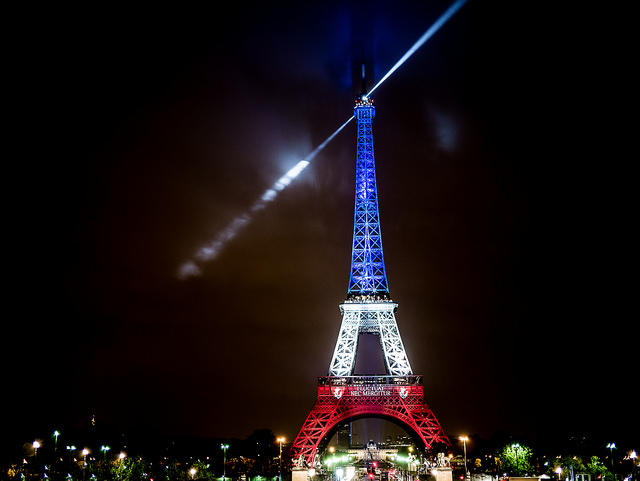In design and execution, the Paris terrorist attacks pose a fundamental question of identity and belief. This is random butchery for a reason, indiscriminate horror for a purpose.
Only one positive thought can be offered about the brutal slaughter: the fundamental question will be answered in different ways to what Islamic State predicts.
Have confidence in that assertion about the outcome because it rests on history as much as belief.
The jihadists have adopted the methods and the extraordinary aim of another movement that terrified Europe and the US a century ago—the anarchists.
The aim is to overthrow the state and deliver the new age. For the jihadists, it’s to restore the caliphate, while the anarchist vision was of a stateless society, without government or ownership of property.
In the 20 years before WWI, six heads of state were assassinated in the name of anarchism: the President of France in 1894, the Premier of Spain in 1897, the Empress of Austria in 1898, the King of Italy in 1900, the US President in 1901 and another Premier of Spain in 1912.
The theorists of anarchism pointed to a glorious new future while preaching hatred against the ruling class and the bourgeois.
The device of choice was ‘propaganda of the deed’ to strike at the enemy and tear down the existing order. Today the language is different but the method recurs.
Islamic State reaches out to the young shock troops who rallied to the anarchist cause—the lonely, angry and marginalised, who ache for something to believe in.
What can history tell us about the jihadists using the weapons of terror? Quite a bit. Not everything, but much that matters. The present doesn’t repeat the past but it always resembles it. So does the future.
The anarchist grasp of economics was hazy, but they knew who they hated. The religious knowledge of the jihadist terrorists is equally hazy, but they, too, are sure about the many targets they are entitled to attack.
The anarchists were fighting against the mighty industrial states that came into being in the 19th Century. Today Islamic State is seeking to redraw the boundaries of the Middle East created by those same 19th Century empires.
The anarchists sought to make explicit the division between those who shared the vision and all others who were enemies.
Islamic State seeks to strike back at the Western powers attacking them; and even more importantly to galvanise all Muslims. The message to Muslims is that they cannot stay in ‘the grey zone’ of secular societies and Western influences.
The anarchists spoke to a marginal few and repelled the great majority. Islamic State is doing exactly the same. The horror pulls in a stream of young recruits while the great rivers of the Islamic world seek to turn away and find other paths.
In the simple equation of for or against us, the answer is in. The great majority is against, whatever their religion.
While anarchists wanted to abolish the state, IS wants to create a new version of a state in its caliphate. The territory IS controls is known, as are many of its leaders.
Lashing out at the people of Paris was the action of a state under attack, losing battles and leaders. The war against IS just got personal for Francois Hollande. The stakes have been raised and France has a target for its anger.
The nuclear deal struck with Iran looks even more like a practical bargain. In war, an unlikely ally is still an ally.
IS wanted to kill ordinary citizens because each person attacked in Paris was a symbol of French life and politics, and the secular right to decide on your own life.
The jihadists had to go after citizens as representatives of the West or democracy or France because of one anarchist legacy. It’s a lot harder these days to get through the protective layers to attack a president or premier as the symbol of the state.
Since the attack on Charlie Hebdo in January, everyone in Paris has understood the idea that any individual is a target. The result is a resigned determination, much like that experienced in London during the IRA bombing campaign.
As that IRA era introduced the ubiquitous surveillance camera, so Paris is becoming used to armed guards everywhere. To be in France this summer was to have a regular encounter with three person military patrols (combat helmet and jacket and automatic weapon) from the big train stations to the grounds of Versailles.
We were on the Paris–Amsterdam fast train the morning that a jihadist going the opposite direction on the Amsterdam–Paris train pulled out an AK47 but was overcome by passengers. In the modern lottery of life, that’s the macabre chance wild card.
A century ago, the anarchists ended up greatly strengthening the state instruments that confronted them—intelligence, police and security institutions.
Al-Qaeda’s attack on the US on September 11 2001 did the same, giving a huge boost to spending on all areas of security. The much larger and richer Western intelligence community we now have is about to get even more muscle and money.
The jihadists are doing a wonderful job on behalf of Western governments confronted by the libertarian critiques posed by Assange and Snowden.
Ironic that the jihadists have gone off the digital grid, abandoned their mobiles and computers so they can stay in the shadows using letters and face-to-face communication. In the argument over the balance between freedom and safety in the digital age, Paris will further tip the scales to government and increased security.
Islamic State has presented the equation in the bloodiest and starkest terms. If the question posed is either random slaughter or stronger government, the answer is simple. Forced to choose, the vast majority of people around the world will decide against Islamic State, just as they once recoiled from the terrorism of the anarchists.


